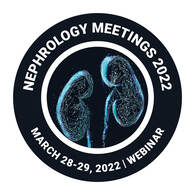Dialysis
The process of removing waste products, excess water, toxins, and solutes from the blood in people whose kidneys no longer function naturally is called dialysis. Dialysis involves diverting blood to be cleaned. Haemodialysis dialysis and peritoneal dialysis are two types of dialysis. Haemodialysis, the most common type of dialysis procedure where a tube is attached to a needle in your arm and the blood passes along the tube, and external machine filters the blood before it is passed back into the arm along another tube. The peritoneal dialysis process on the other side uses the inside lining of your abdomen (the peritoneum) as the filter, instead of a machine. The peritoneum contains thousands of tiny blood vessels, making it a useful filtering device just like the kidneys. Dialysis treatment can be stopped if the kidney disease is temporary and the patients get recovered.
Related associations and societies: International Society of Nephrology (ISN), American Society of Nephrology (ASN), UK Kidney Association (UKKA), Canadian Society of Nephrology (CSN), Hong Kong Society of Nephrology (HKSN), California Dialysis Council (CDC), International Society for Hemodialysis (ISHD), American Society of Transplantation (AST), Saudi Society of Nephrology and Transplantation (SSN&T), Australian and New Zealand Society of Nephrology (ANZSN), Malaysian Society of Nephrology (MSN), National Kidney Foundation (NKF)
Related Conference of Dialysis
6th International Conference on Clinical Immunology, Neuropharmacology and Drug Development
22nd International Conference on Nephrology, Urology and Therapeutics
13th European Congress on Nephrology, Internal Medicine and Kidney Diseases
Dialysis Conference Speakers
Recommended Sessions
- Acute Kidney Failure
- Biopsy
- Chronic Kidney Disease
- Clinical Nephrology
- Diabetic Nephropathy
- Diagnosis and treatment of kidneys
- Dialysis
- Drugs and Medication for Kidney Disease
- Glomerulonephritis
- Hematuria and Proteinuria
- Hydro Nephrosis
- Impact of Covid-19 on Nephrology
- Kidney Transplantation
- Lupus Nephritis
- Nephrology
- Pediatric Nephrology
- Pre-eclampsia and kidney disease
- Renal Cell Cancer
- Renal Nutrition & Diet
- Renal Pathology
- Renal Replacement Therapy
- Urinary Tract Infections
- Urology
Related Journals
Are you interested in
- Acute Kidney Injury - Kidney Care 2024 (UK)
- Advanced Imaging Techniques: 3D Mapping and Functional Assessments - EURO NEPHROLOGY 2024 (Germany)
- AI in Renal Diagnostics: Enhancing Accuracy and Efficiency - EURO NEPHROLOGY 2024 (Germany)
- Biomarkers in Kidney Disease - KIDNEY MEET 2024 (Spain)
- Biomarkers of Kidney Diseases - Euro Nephrology Summit 2025 (France)
- Blockchain in Nephrology: Ensuring Security and Transparency in Health Records - EURO NEPHROLOGY 2024 (Germany)
- Cardiorenal Syndrome - Euro Nephrology Summit 2025 (France)
- Cardiovascular Impact of Kidney Disease - KIDNEY MEET 2024 (Spain)
- Cardiovascular Impacts of Kidney Diseases - Nephrologists 2024 (France)
- Chronic Kidney Disease - KIDNEY MEET 2024 (Spain)
- Clinical Nephrology - Nephrologists 2024 (France)
- Clinical Nephrology - Kidney Care 2024 (UK)
- Clinical Nephrology - Euro Nephrology Summit 2025 (France)
- CRISPR and Gene Editing in Nephrology: Precision Medicine Approaches - EURO NEPHROLOGY 2024 (Germany)
- Critical Care Nephrology - KIDNEY MEET 2024 (Spain)
- Diabetic Nephropathy - KIDNEY MEET 2024 (Spain)
- Diabetic Nephropathy - Kidney Care 2024 (UK)
- Diabetic Nephropathy - Euro Nephrology Summit 2025 (France)
- Diagnostic, Imaging and Radiation Techniques - Euro Nephrology Summit 2025 (France)
- Dialysis - KIDNEY MEET 2024 (Spain)
- Dialysis - Nephrologists 2024 (France)
- Dialysis - Kidney Care 2024 (UK)
- Diet for Kidney Health - Euro Nephrology Summit 2025 (France)
- Digital Biomarkers in Nephrology: From Wearables to Remote Monitoring - EURO NEPHROLOGY 2024 (Germany)
- Drug Discovery and Preclinical Models - Neuropharmacology 2024 (Scotland)
- Drugs for Kidney Disease - KIDNEY MEET 2024 (Spain)
- Drugs for Kidney Diseases - Kidney Care 2024 (UK)
- Drugs used in the treatment of Kidney Diseases - Euro Nephrology Summit 2025 (France)
- Emerging Technologies and Diagnostics - Nephrology Congress 2024 (Singapore)
- Extracellular Vesicles in Renal Communication: Implications for Therapeutics - EURO NEPHROLOGY 2024 (Germany)
- Geriatric Nephrology - Kidney Care 2024 (UK)
- Geriatric Nephrology and Urology - Nephrology Congress 2024 (Singapore)
- Global Perspectives in Nephrology and Urology - Nephrology Congress 2024 (Singapore)
- Glomerular Disease - Euro Nephrology Summit 2025 (France)
- Glomerular Diseases - Nephrologists 2024 (France)
- Hereditary Kidney Disorders - Nephrologists 2024 (France)
- Hereditary Kidney Disorders - Euro Nephrology Summit 2025 (France)
- Hypertension & Diabetic Associated Kidney Diseases - Nephrologists 2024 (France)
- Hypertension associated with Kidney Diseases - Euro Nephrology Summit 2025 (France)
- Hypertension effect on kidney - KIDNEY MEET 2024 (Spain)
- Immunotherapy for Glomerular Diseases: Targeting the Immune System - EURO NEPHROLOGY 2024 (Germany)
- Kidney and Bladder Cancer - Kidney Care 2024 (UK)
- Kidney and Bladder Stones - Nephrologists 2024 (France)
- Kidney Diseases - Nephrologists 2024 (France)
- Kidney Failure - KIDNEY MEET 2024 (Spain)
- Kidney Stones - KIDNEY MEET 2024 (Spain)
- Kidney Stones - Euro Nephrology Summit 2025 (France)
- Kidney Transplantation - KIDNEY MEET 2024 (Spain)
- Kidney Transplantation - Nephrologists 2024 (France)
- Kidney Transplantation - Kidney Care 2024 (UK)
- Kidney Transplantation - Euro Nephrology Summit 2025 (France)
- Kidney Urology - Nephrologists 2024 (France)
- Kidney-on-a-Chip Technology: Mimicking Physiological Conditions for Research - EURO NEPHROLOGY 2024 (Germany)
- Metabolomics in Nephrology: Unraveling Metabolic Pathways in Disease - EURO NEPHROLOGY 2024 (Germany)
- Mineral and Bone Disorder in CKD - KIDNEY MEET 2024 (Spain)
- Nanotechnology in Kidney Therapeutics: Small Solutions, Big Impact - EURO NEPHROLOGY 2024 (Germany)
- Nephrological Treatment - Nephrologists 2024 (France)
- Nephrology - Nephrologists 2024 (France)
- Nephrology - Kidney Care 2024 (UK)
- Nephrology - Euro Nephrology Summit 2025 (France)
- Nephrology Advances - Nephrology Congress 2024 (Singapore)
- Nephrology Nursing - KIDNEY MEET 2024 (Spain)
- Nephrology Nursing - Kidney Care 2024 (UK)
- Nephrology Nursing & Health Care - Nephrologists 2024 (France)
- Nephrotic Syndrome - Euro Nephrology Summit 2025 (France)
- Neuroimmunology and Immunopharmacology - Neuropharmacology 2024 (Scotland)
- Neuroinflammation and Neurodegeneration - Neuropharmacology 2024 (Scotland)
- Neurological Disorders and Therapeutic Innovations - Neuropharmacology 2024 (Scotland)
- Neuropharmacology and Aging - Neuropharmacology 2024 (Scotland)
- Neuropharmacology of Pain Management - Neuropharmacology 2024 (Scotland)
- Neuroplasticity and Cognitive Enhancement - Neuropharmacology 2024 (Scotland)
- Neuropsychopharmacology and Addiction Medicine - Neuropharmacology 2024 (Scotland)
- Neurotransmitter Systems and Drug Development - Neuropharmacology 2024 (Scotland)
- New Updates in Nephrology and Hypertension - Nephrologists 2024 (France)
- Patient-Centered Care: - Nephrology Congress 2024 (Singapore)
- Patient-Reported Outcomes and Shared Decision-Making in Nephrology Care - EURO NEPHROLOGY 2024 (Germany)
- Pediatric Nephrology - Nephrologists 2024 (France)
- Pediatric Nephrology - Kidney Care 2024 (UK)
- Pediatric Nephrology - Euro Nephrology Summit 2025 (France)
- Pediatric Nephrology and Urology - Nephrology Congress 2024 (Singapore)
- Pediatric Urology - Nephrologists 2024 (France)
- Pediatrics and Geriatric Nephrology - KIDNEY MEET 2024 (Spain)
- Personalized Nutrition in Nephrology: Tailoring Diets for Renal Health - EURO NEPHROLOGY 2024 (Germany)
- Pharmacogenomics in Renal Drug Response: Customizing Treatments for Individuals - EURO NEPHROLOGY 2024 (Germany)
- Psychiatric Disorders and Pharmacotherapy - Neuropharmacology 2024 (Scotland)
- Renal Health in Aging Populations: Geriatric Nephrology Updates - EURO NEPHROLOGY 2024 (Germany)
- Renal Nutrition - KIDNEY MEET 2024 (Spain)
- Renal Nutrition - Nephrologists 2024 (France)
- Renal Nutrition and Metabolism - Kidney Care 2024 (UK)
- Renal Organoids: Modeling Kidney Diseases for Drug Discovery - EURO NEPHROLOGY 2024 (Germany)
- Renal Pathology & Immunology - Kidney Care 2024 (UK)
- Renal Pathology and Immunology - KIDNEY MEET 2024 (Spain)
- Renal Pathology-Immunology - Nephrologists 2024 (France)
- Renal Regenerative Medicine: Stem Cells and Tissue Engineering - EURO NEPHROLOGY 2024 (Germany)
- Robotic kidney transplantation - KIDNEY MEET 2024 (Spain)
- Smart Dialysis Devices: Innovations for Home-based Renal Therapies - EURO NEPHROLOGY 2024 (Germany)
- Stages of Kidney Diseases - Euro Nephrology Summit 2025 (France)
- Stem Cells in Renal Disorders - KIDNEY MEET 2024 (Spain)
- Stem cells in Renal Disorders - Euro Nephrology Summit 2025 (France)
- Surgery for Renal Disease - KIDNEY MEET 2024 (Spain)
- Technological Advancements in Nephrology - Euro Nephrology Summit 2025 (France)
- The End Stage Renal Diseases & Chronic Kidney Diseases - Kidney Care 2024 (UK)
- Therapeutic Strategies - Nephrology Congress 2024 (Singapore)
- Translational Research in Nephrology and Urology - Nephrology Congress 2024 (Singapore)
- Tubular and Interstitial Diseases - Nephrologists 2024 (France)
- Urinary Tract Infections - Nephrologists 2024 (France)
- Urologic Diseases - Nephrologists 2024 (France)
- Urology - KIDNEY MEET 2024 (Spain)
- Urology - Nephrologists 2024 (France)
- Urology / Urinary Tract Infections - Kidney Care 2024 (UK)
- Urology Innovations - Nephrology Congress 2024 (Singapore)
- Women Health and Pregnancy - KIDNEY MEET 2024 (Spain)


